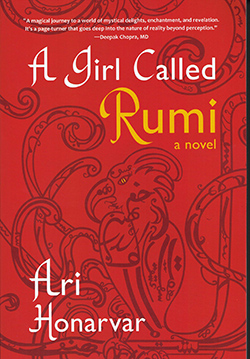A Girl Called Rumi by Ari Honarvar; Portland, Oregon: Forest Avenue Press (c) 2021; ISBN 9781942-436461; 352 pages.
By Donald H. Harrison

 SAN DIEGO — Iranian-born San Diegan Ari Honarvar has written a novel juxtaposing the gentle mysticism of the Sufi sect of Islam with life under the strict fundamentalist interpretation of Islam in modern-day Revolutionary Iran.
SAN DIEGO — Iranian-born San Diegan Ari Honarvar has written a novel juxtaposing the gentle mysticism of the Sufi sect of Islam with life under the strict fundamentalist interpretation of Islam in modern-day Revolutionary Iran.
While this is far from a Jewish book, per se; there are certain touchstones with which Jewish readers will be familiar. For example, the protagonist Kimia, whose name in Persian means “rare” or “unique” and whom we meet in 1981 when she is just nine years old, remembers a verse by the Persian poet Hafez after her father is called away for military service in the Iran-Iraq War. “The lost Youssef will come back to Canaan, do not despair,” it said, an obvious allusion to the biblical Joseph. Later she enters a trap-door on the floor of a stage where puppet shows are given. “I imagined the trap-door was the mouth of a mighty whale that had swallowed the city noise and was drawing me into its mysterious belly” — an equally obvious allusion to the biblical Jonah. At another point in the book, Kimia remembers when she had protested against the Shah of Iran, believing falsely that something better would replace him. During a riot during those days of protest, she and her mother had found refuge in a Jewish neighborhood of Shiraz. And finally, after her dear father was killed in the Iran-Iraq War, Kimia helps her mother at the khatm, a home gathering that resembles sitting shiva.”
Along with her friend Reza, a name in Persian meaning “contentment,” which proves to be ironic nomenclature, she visits an old man who lives in the basement under the floor boards of the stage. A natural story teller, who says his name is “Baba Morshed,” which one could translate as “wise teacher, or mentor,” he asks Kimia her name. Uncertain of her new friend, she lies and says her name is “Rumi,” which was the name of a beloved 13th century Persian poet, whose family was identified with a form of Sufiism, a mystical branch of Islam with which some writers have found comparisons to Kabbalistic Judaism. Reza misidentifies himself as Kaveh, a name meaning “of royal origin.” Baba Morshed plays along with the children’s lies, and over several chapters of the book that alternate with events from the Iran of the year 2009, the storyteller relates the myth of the birds who risked a perilous journey to find the Simorgh, a mythical giant bird idealized as the embodiment of love and kindness. An image of the Simorgh is on the front cover of the book.
To find the Simorgh, the birds would have to leave their homes on what might be their last journey, and pass over the valley of the quest, the valley of the beloved, the valley of understanding, the valley of detachment, the valley of unity, the valley of awe, and the valley of death — each stop on this allegorical trip fraught with its own dangers, and each having analogs in the real world of the Iranian mullahs in which Kimia and Reza ultimately traveled.
As the story is told, we are offered some Sufi wisdom in the form of cherish-worthy quotations: “A well lived life is not absent of pain … Life is much larger than that. It includes pain, includes sorrow, heartbreak and breaking defeat. All states are sacred, and we must treat them with the dignity they deserve,” we are informed at one point. At another: “Understanding for each traveler comes in a rare parcel. You must recognize that parcel and forgo all temporary knowledge. Some will attempt to possess it, but understanding is too clever to be captured.” And one more: “Violence has a way of carving its invisible marks. It shows up in hypervigilance. it shows up in trembling hands. It shows up in nightmares.”
Honarvar’s works should be treasured. For us San Diegans, the fact that this wonderful writer includes references to our own beloved city adds to the novel’s sweetness.
*
Donald H. Harrison is editor of San Diego Jewish World. He may be contacted via donald.harrison@sdjewishworld.com
A Girll Called Rumi, Ari Horarvar’s debut novel takes you on an incredible journey and as I read this enchanting and mystcal tale, i felt as i was there every step of the way. As a life long human rights activist i have dealt with trauma and tragedy my entire life. This book teaches me of resilience, teaches me to welcome the many wounds that have found me. It is in the wounds, that the light comes in. A Girl Called Rumi is a sacred treasure. Thank you Ari, for showing me that I have always had the key, to open the cell door of the prison I had lived in my entire life. Thank you for showing me how to spead my wings and fly. Enrique Morones, Gente Unida San Diego, California.